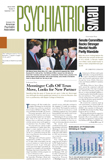APA has joined the American Medical Association, the Academy of Psychosomatic Medicine, the American Pain Society, and other medical organizations in adopting core principles for the care of patients toward the end of their lives. The APA Board of Trustees endorsed the principles at its meeting in late June.
The principles concern such matters as respecting the dignity of both the patient and caregivers; being sensitive to and respectful of a patient’s and a family’s wishes; using the most appropriate measures that are consistent with a patient’s choices; alleviating pain and other physical symptoms; assessing and managing psychological, social, and spiritual difficulties; letting the patient continue to be cared for, if so desired, by his or her primary care and specialist providers; providing access to any therapy that may realistically be expected to improve a patient’s quality of life, including alternative or nontraditional treatments; providing access to palliative and hospice care; respecting the patient’s right to refuse treatment; respecting the physician’s professional responsibility to discontinue some treatments when appropriate, with consideration for both the patient’s and the family’s preferences; and promoting clinical and evidence-based research on providing care at the end of life.
Mary Ellen Foti, M.D., medical director of the Massachusetts Department of Mental Health, a member of APA’s End-of-Life Committee, and liaison to the APA Assembly from the American Association of Psychiatric Administrators, was the APA member who introduced the proposal to adopt the end-of-life-care principles at the APA Assembly. Not surprisingly, she is pleased with APA’s endorsement. “This is an area where psychiatrists have a tremendous amount to offer,” she told Psychiatric News.
For instance, she pointed out, “There are many syndromal complexes that are really psychiatric that occur in this terminal phase of life. It is not just delirium, which is one of the common things that people see. You also see depression. You also see tremendous anxiety. You see suicidal ideation. You see requests for euthanasia. There is a whole host of psychiatric issues that comes up.”
And psychiatrists, she believes, should also get involved in research to improve end-of-life care for patients. She said that she and colleagues at the University of Massachusetts have a Robert Wood Johnson Foundation grant to enhance end-of-life care for persons with mental illnesses.
For example, they are attempting to learn whether mentally ill patients have end-of-life preferences similar to those of the general population. They have developed a tool that allows clinicians to assess a person’s capacity to choose a health care proxy and are helping hospice workers feel more comfortable communicating with individuals who have serious mental illnesses, she said.
More information about the core principles for end-of-life care the Board endorsed and the medical specialties involved can be found on the Project on Death in America’s Web site, www.soros.org/death. ▪
